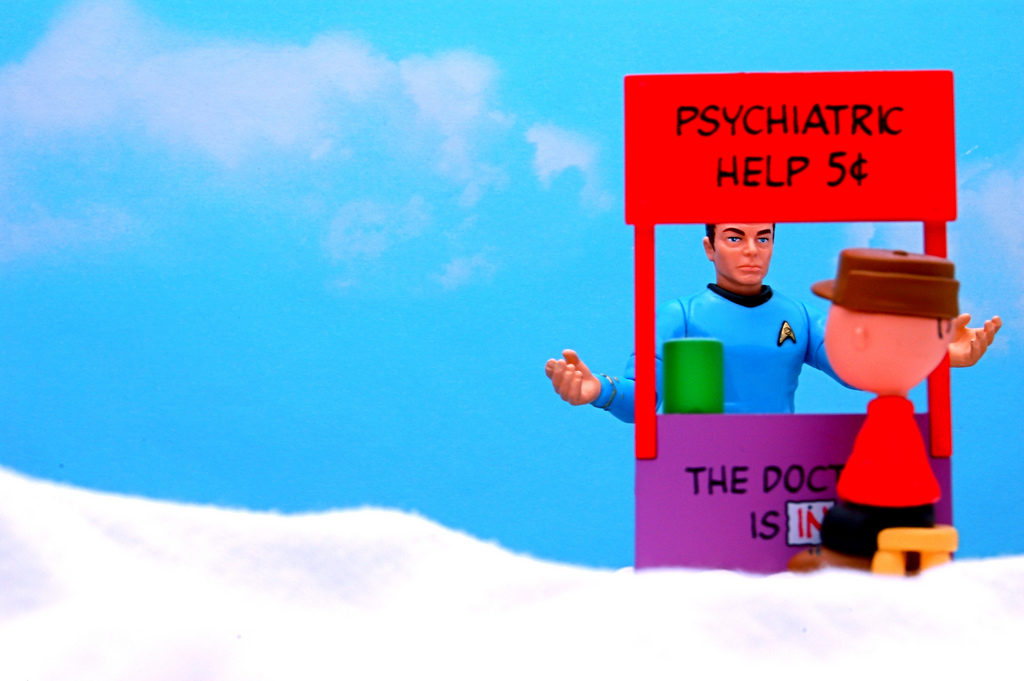As part of the Journal of Humanistic Psychology’s second special issue on Diagnostic Alternatives, researchers continue the important conversation around re-envisioning psychology and psychiatry. Beyond critiquing the shortcomings of the current paradigm of mental health care and its corresponding diagnostic systems, a diverse group of researchers offer alternatives and explore new approaches that privilege both science and service users.
“The varied articles in this special issue are intended to highlight the diversity of diagnostic alternatives currently in development and existence,” the editors write.
“The existence of multiple alternatives to the current diagnostic paradigm demonstrates that diagnostic systems are not fixed or predetermined classifications of objective entities found in nature, but rather conceptual and empirically inspired models that evolve and transform over time.”

In one of the featured articles, “’But what about real mental illnesses?’ Alternatives to the disease model approach to ‘schizophrenia,’” Dr. Anne Cooke engages the debate surrounding criticisms of diagnostic systems and the medicalization of “psychosis.” Cooke takes the conversation further, promoting alternative systems of classification that emphasize conceptual formulations of individual experiences.
Anne Cooke is also the editor of the British Psychological Society’s (BPS) recently revised report titled “Understanding psychosis and schizophrenia: why people sometimes hear voices, believe things others find strange, or appear out of touch with reality, and what can help” (see recent MIA report). Peter Kinderman, also a major contributor to the BPS report, offers an explicit critique of “disease” models on behalf of a clinical division representing the majority of psychologists working in UK mental health settings.
In this special issue, Cooke and Kinderman summarize the striking shortcomings pervading current approaches to “schizophrenia.” First, they argue that the distinction between “normal” and “psychotic” experiences cannot be concretely identified, much less scientifically supported. This point is especially salient when taking into consideration how common it is for people to have “psychotic” experiences, typically consisting of hearing voices and experiencing paranoia. Not only are these experiences subjectively understood, but their appraisal varies dramatically across cultures.
The reality of these experiences across people and cultures underscores a need to conceptualize experiences of “psychosis” on a continuum, the authors argue. Further, the faulty and arbitrary nature of the “schizophrenia” construct is demonstrated by its failure to uphold the basic scientific tenets of reliability, validity, and utility.
There are discrepancies across clinicians, hospitals, and countries when observing the construct of “schizophrenia” through DSM-5 criteria. Without evidence for an underlying biological cause, the construct seems to only be reified circularly, through identifying the associated “symptoms.”
Finally, research demonstrating how the label of “schizophrenia” does more harm than good undermines the professed utility of employing current diagnostic categories, the authors argue. However, the idea of “schizophrenia” remains engrained in mental health institutions for a number of reasons, including the field’s own vested interests. Nevertheless, the authors highlight signs of change, pointing to increased media coverage and mounting interest in movements toward patient-centered models and alternative classification systems.
Alongside suggesting approaches that privilege service-user perspectives, collaborative conceptual formulations, and psychosocial explanations, the authors note a need to stray away from framing experiences within “brain or blame” explanations. In other words, they argue toward understanding experiences in a way that neither suggests individuals are to blame nor that their problems are “all in their mind.” Cooke and Kinderman end their article with the words of someone who has been personally affected by the current mental health paradigm:
“If psychologists are right that the primary causes of mental illness are psychosocial rather than biological, my family narrative can be re-written. We can emerge from our closets of shame and take our rightful place on the continuum of acceptable human experience.”
Another contribution featured in this JHP special edition challenges the DSM/ICD monopoly on diagnosis by suggesting a different approach to classification that retains practical benefits while emancipating practitioners from a pathology-based medical model focus. In “The Classification and Statistical Manual of Mental Health Concerns: A proposed practical scientific alternative to the DSM and ICD,” Dr. Jeffrey Rubin outlines an argument for an alternative system, The Classification and Statistical Manual of Mental Health Concerns (CSM). Rubin delineates the primary limitations of the DSM/ICD approach:
“Among these are that it tends to be stigmatizing to mental health service users, it
violates basic principles of science, it privileges the clinician’s perspective over that of the mental health service user, and it has become a monopoly, with all of the drawbacks associated with such institutions.”
Essentially, he notes that the DSM/ICD system puts forth the idea that a “disturbance” exists as a result of “mental dysfunction in the individual.” While offering scant science to support that claim, or to support the 300 constructs listed as “disorders” in the DSM, there is also no direct, reliable, or valid way to assess individual “functioning.” The final decision of determining whether presentations are “clinically significant” then rests in the hands of clinicians who are influenced by both service demands and their financial interests.
Rubin writes, “the lack of reliability and validity for the DSM and applying the word ‘diagnosis’ in a misleading, imprecise manner are three violations of the principles of science. The final problem with the DSM that I will discuss here is that despite the questions that have sprung up about its validity, it appears oblivious to the ontological fallacy, that is, to believing that because we have given a name to something we think that we see, that that something must exist.”
The CSM approach, in contrast, emphasizes that “individuality outruns any classification system.” By replacing mental health “disorder” with the term “concern,” its main construct is defined as follows:
“A mental health concern occurs when a person seeking mental health services expresses to a mental health service provider a concern about any of these topics: behavior, emotion, mood, addictions, meaning of life, death, dying, managing chronic pain, work, relationships, education, eating, cognition, sleep, and challenging life situations.”
In this way, the concern is defined by the help-seeker, who also identifies their personal identities and contextual factors. Following this classification, both parties co-construct a hypothesis about the nature and origin of the concern.
Rubin notes that the CSM system would introduce positive competition in a field where the DSM/ICD approach dominates. Additionally, he makes the case that the CSM system can easily be used by third-party payers and practically incorporated into a society with vast organizations, including education programs, aligning themselves with “mental health” missions.
“For these reasons, the CSM would maintain the concept of ‘mental health’ so it can be comfortably and realistically accommodated into the many large organizations currently using it,” he writes. However, the CSM would use the term ‘mental health’ in a way that is different from what is implied in the DSM and the ICD. The CSM would explicitly reject the idea that the opposite of mental health is mental illness.”
Unlike the DSM/ICD system, CSM is atheoretical and oriented toward reducing stigma and elevating respect for service users. Its attunement to research, and focus on the empowerment of individuals seeking help, offers a potential response to recent outcries and calls for change in the field (see MIA report).
Accompanying these two articles are a broad range of diverse topics that form this second special issue including a collaborative psychotherapy feedback/outcome measure led by Barry Duncan, psychological formulations as an alternative to diagnosis, and an informed consent model to transgender care as an alternative to gender dysphoria.
The editors of the special issue, Kamens, Flanagan, and Robbins, write:
“We believe that the diagnostic alternatives envisioned by these authors in this issue generate hope for a uniquely humanistic, person-centered future in mental health research and practice.”
***
See the full issue here















Do you have a “mental health” blank, and fill in the blank with any word besides “illness”. Here that word is “concern”. I dunno. I just see a bunch of weasels in the hen-house. No hens however.
Thomas Szasz wrote a book, Schizophrenia: The Sacred Symbol of Psychiatry. It is interesting that in this context that sacred symbol would be demystified, however, that leaves one with other, mostly milder, forms of medicalizing, starting with depression, ye ole melancholia.
AND…they don’t really get rid of it, no, they just do a bit of tap dancing rewording.
I would suggest that there are many “mental health” whatchamacallits that are not in the brain at all, but are, as you would be feign to say, entirely “in the mind”. As such, “treating” the innocent brain is something that can become highly problematic. The wiley mind will take care of itself.
I do see a lot of fluff here though. How can we, in other words, increase business, while at the same time making it look like ours is solely a “health concern”? Just think, P. T. Barnum is often rumored to have said, ‘a sucker is born every second’.
Report comment
As to, “they argue that the distinction between “normal” and “psychotic” experiences cannot be concretely identified, much less scientifically supported,” this is very true. Today’s American psychologists believe all thoughts, gut instincts, and dreams are “psychosis.” With this current American definition of “psychosis,” the entire world would be “psychotic,” since we all dream.
As to, “the faulty and arbitrary nature of the ‘schizophrenia’ construct is demonstrated by its failure to uphold the basic scientific tenets of reliability, validity, and utility … [and] the label of ‘schizophrenia’ does more harm than good.” You “mental health professionals” seem to neglect to mention that today’s “gold standard treatment” for “schizophrenia,” the antipsychotics/neuroleptics, can – all by themselves – actually create both the negative and positive symptoms of “schizophrenia.” The negative symptoms are created via neuroleptic induced deficit syndrome and the positive symptoms are created via antidepressant and/or antipsychotic induced anticholinergic toxidrome.
This means it’s highly likely the most common etiology of “schizophrenia” is iatrogenesis, as opposed to having a “genetic” etiology.
As to, “A mental health concern occurs when a person seeking mental health services expresses to a mental health service provider a concern about any of these topics: behavior, emotion, mood, addictions, meaning of life, death, dying, managing chronic pain, work, relationships, education, eating, cognition, sleep, and challenging life situations.”
Since, “the prevalence of childhood trauma exposure within borderline personality disorder patients has been evidenced to be as high as 92% (Yen et al., 2002). Within individuals diagnosed with psychotic or affective disorders, it reaches 82% (Larsson et al., 2012)” today. Which means the majority of those labeled with the “serious” DSM disorders are actually child abuse victims with a legitimate concern, as opposed to being brain diseased people, at least prior to being drugged.
So mentioning the reality that our society has a huge pedophilia problem, and also child trafficking problems, evidence of which is now all over the internet. And the importance of ending the mass poisoning of child abuse victims, which is a way the “mental health professionals” aid, abet, and empower pedophiles, which you should not want to continue doing, since this is illegal. Specifically adding concerns or symptoms of child abuse should likely be added to this list.
I do so hope the “mental health professionals” do some day get out of the business of aiding, abetting, and empowering the pedophiles. Since such illegal behavior is illegal for good reason. Having a multibillion dollar industry which aids, abets, and empowers pedophiles on a massive scale is a good way to create hell on earth for the majority of people on this planet.
It’s a shame those who thought “the dirty little secret of the two original educated professions” was clever, didn’t have the foresight to see the lack of wisdom of their crimes.
Report comment